Module 10 On the radio Unit 2 It seemed that they were speaking to me in person教学课件
文档属性
| 名称 | Module 10 On the radio Unit 2 It seemed that they were speaking to me in person教学课件 | 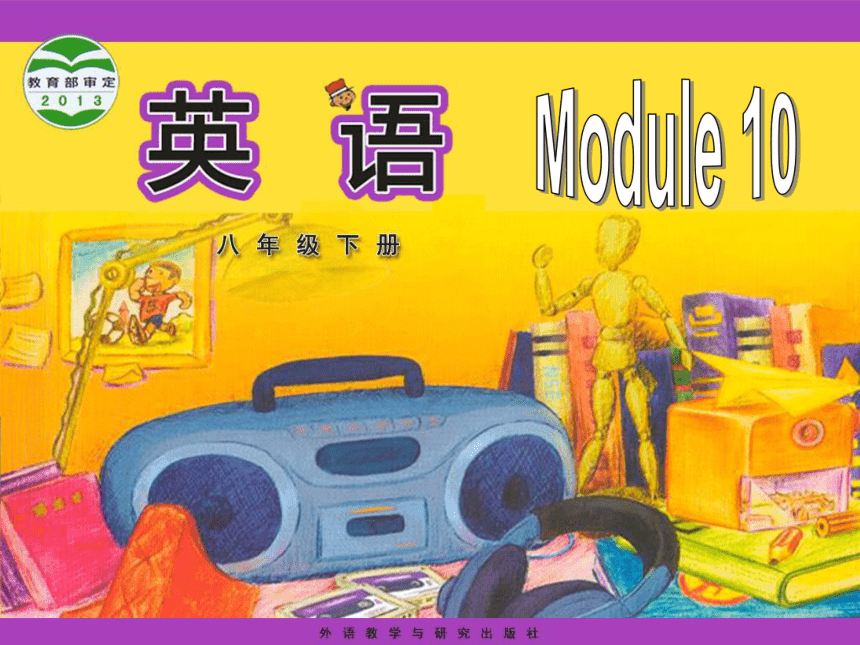 | |
| 格式 | zip | ||
| 文件大小 | 3.6MB | ||
| 资源类型 | 教案 | ||
| 版本资源 | 外研版 | ||
| 科目 | 英语 | ||
| 更新时间 | 2014-03-14 20:44:38 | ||
图片预览

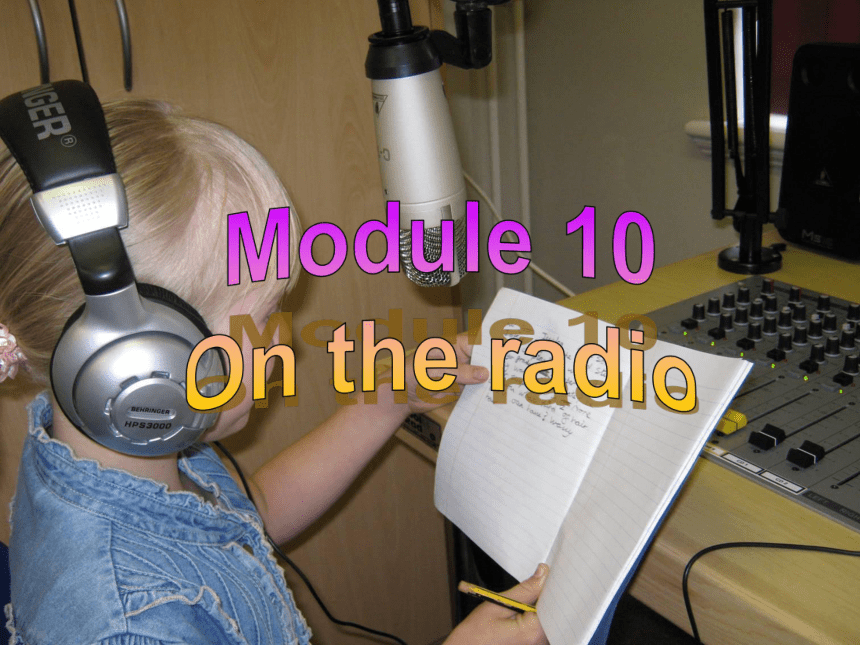
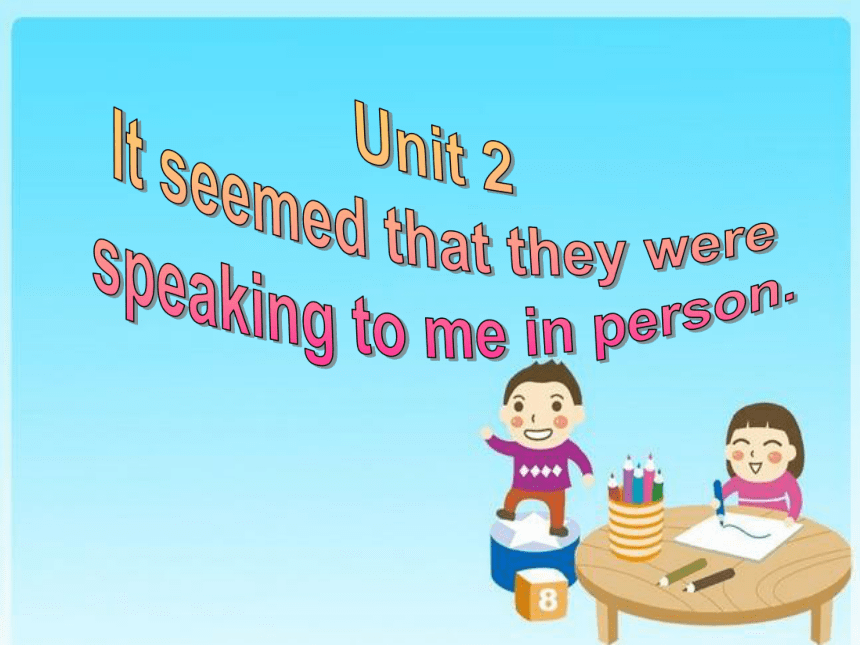
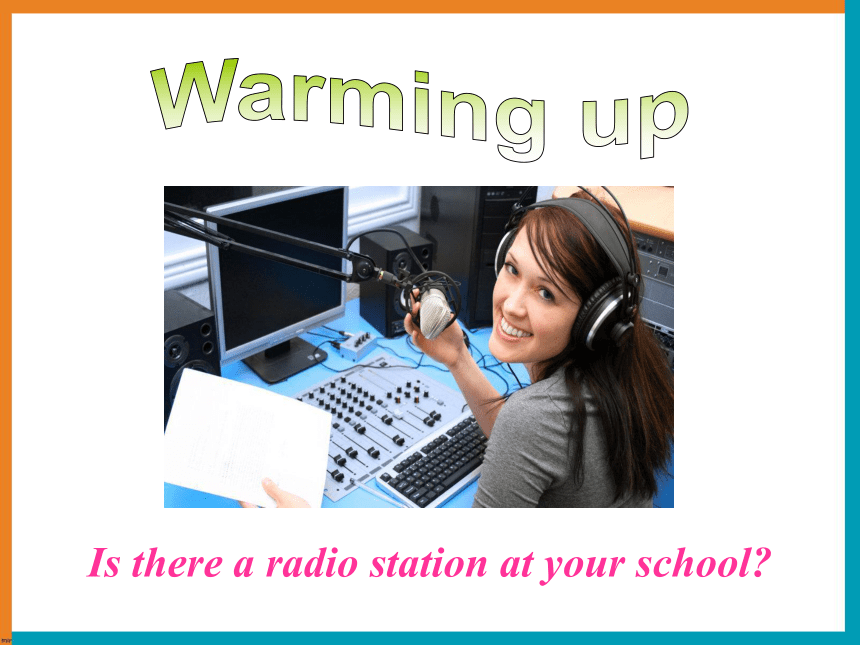
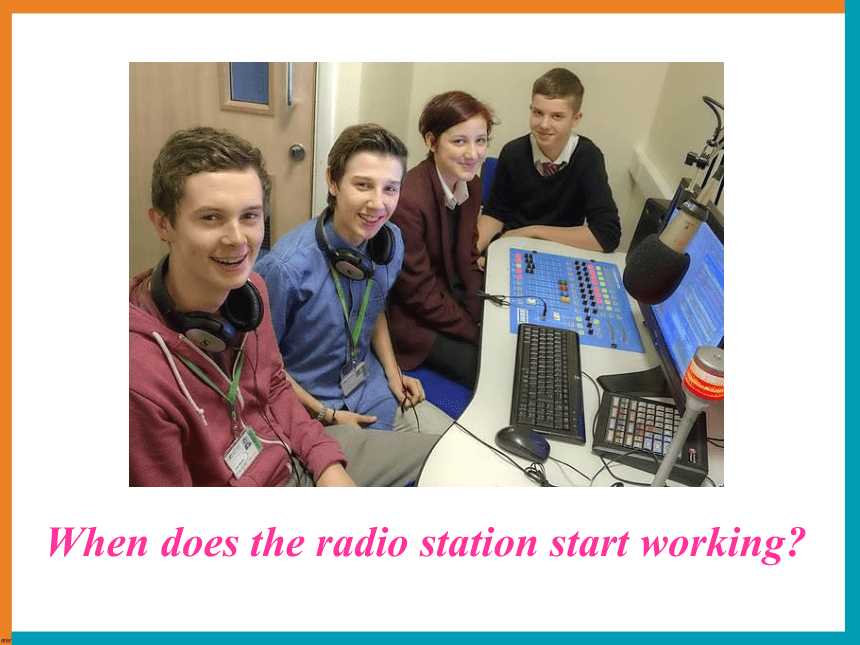
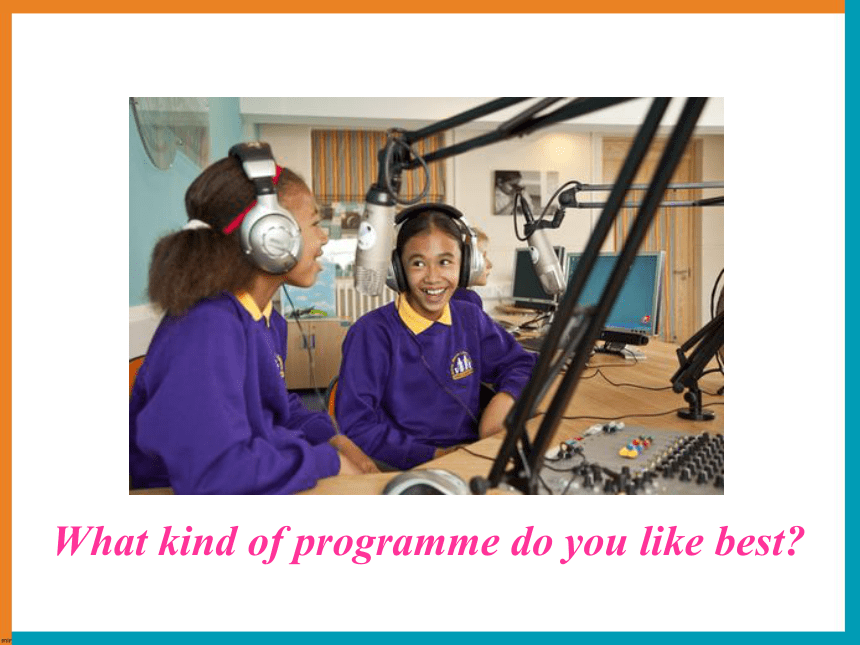
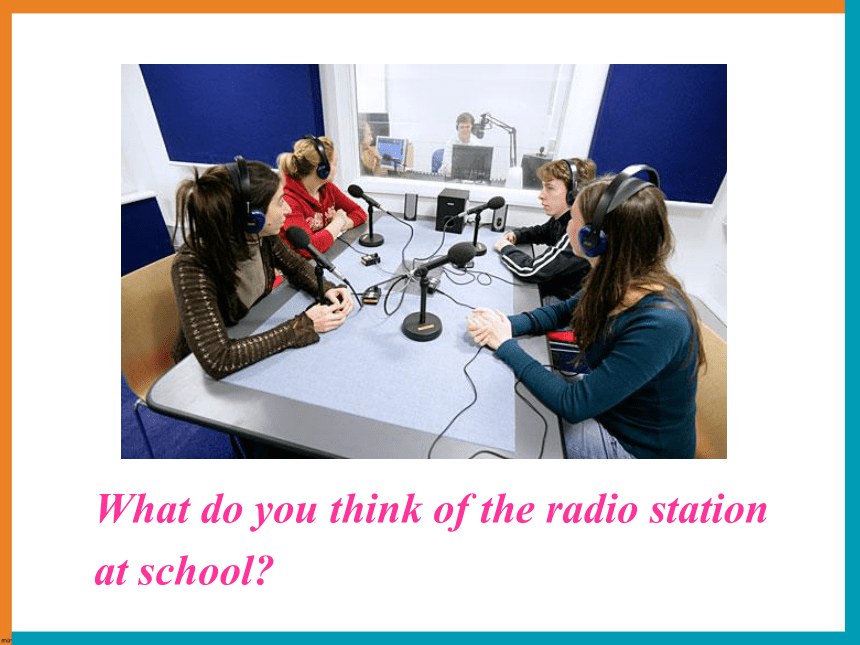
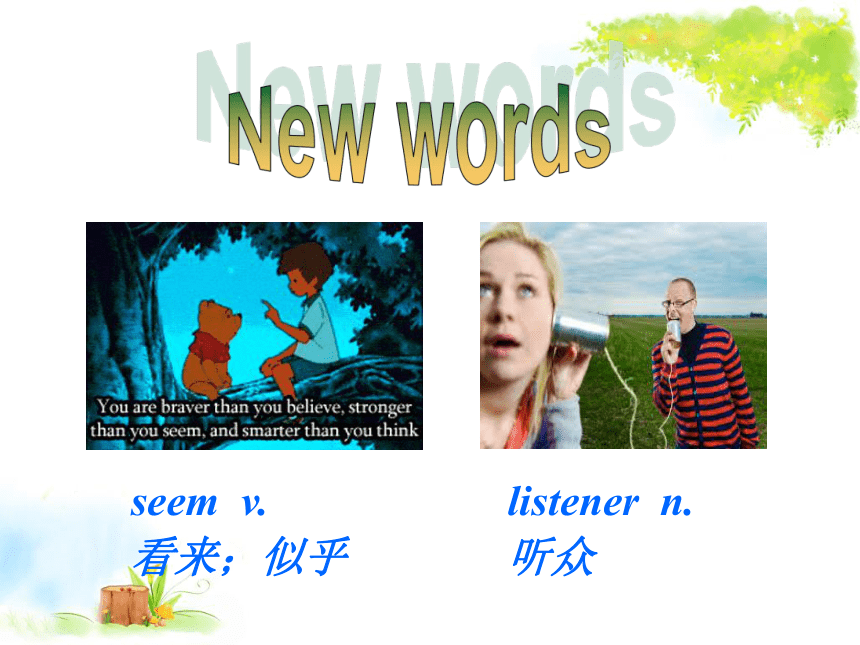
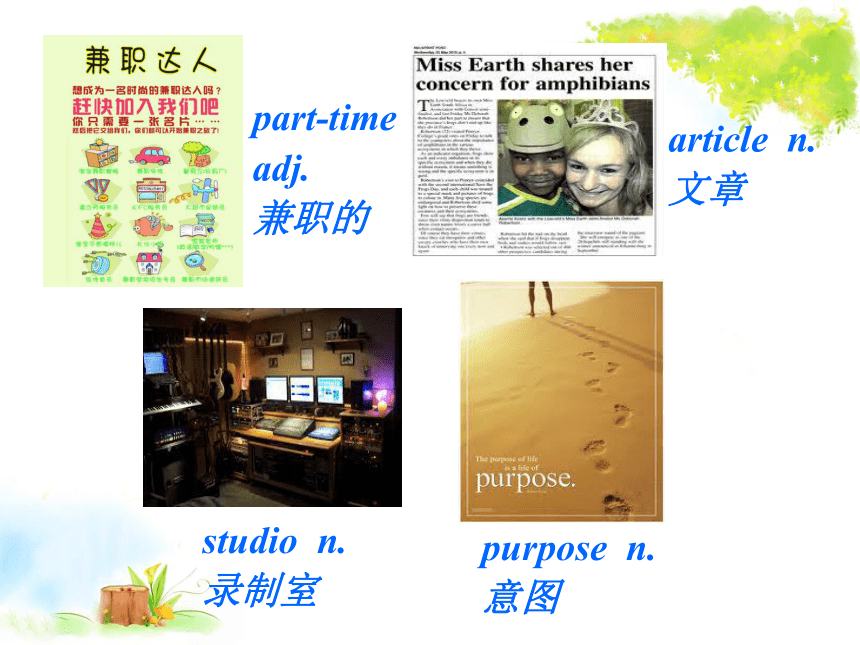
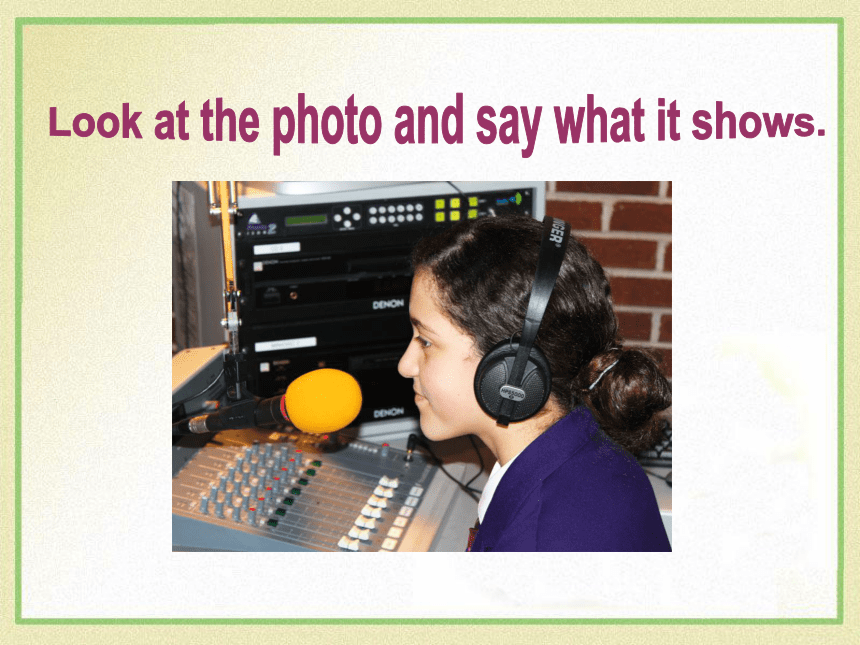
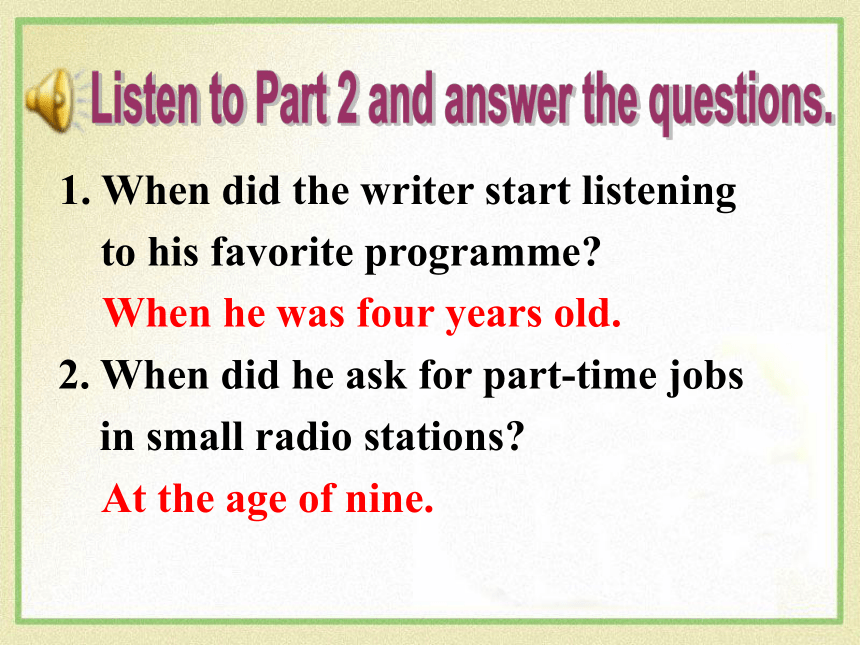
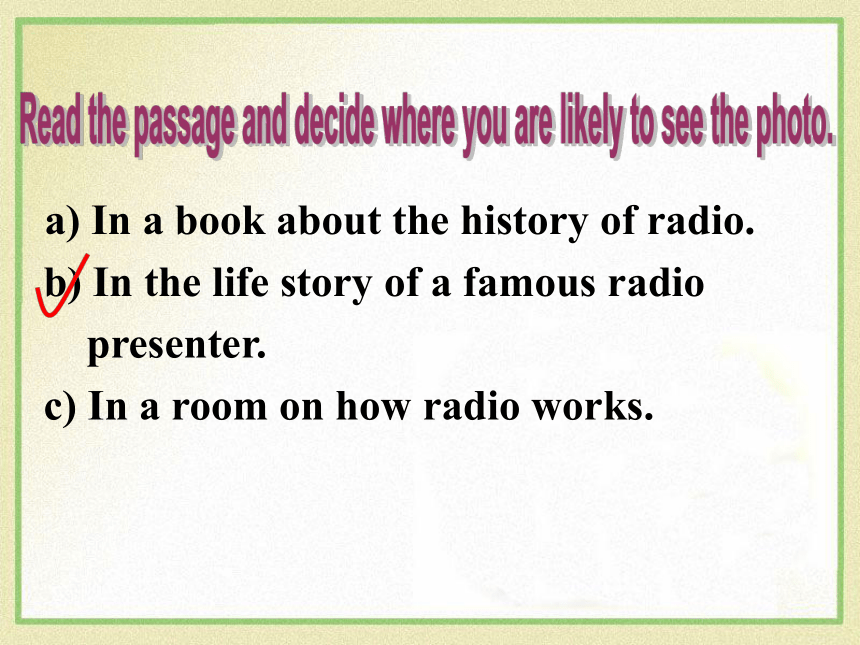
文档简介
课件40张PPT。Module 10Module 10
On the radioUnit 2
It seemed that they were
speaking to me in person.Is there a radio station at your school?Warming upWhen does the radio station start working?What kind of programme do you like best?What do you think of the radio station
at school?seem v.
看来;似乎listener n.
听众New wordspurpose n.
意图article n.
文章studio n.
录制室part-time adj.
兼职的Look at the photo and say what it shows.Listen to Part 2 and answer the questions.1. When did the writer start listening to his favorite programme?When he was four years old.2. When did he ask for part-time jobs in small radio stations?At the age of nine.Read the passage and decide where you are likely to see the photo. In a book about the history of radio.
In the life story of a famous radio
presenter.
c) In a room on how radio works.The writer met ________________ in a radio station.
The manager asked why he wanted a job _______.
At the age of four, the writer __________
________________________, listening to his favorite programmes.Complete the sentences.a radio managerin radio sat close to the radio in the living roomAt the age of nine, he asked for part-time jobs in _________________.
As he grew older, he learnt about ____________.
This was how the writer’s ___________________ began.small radio stationsInternet radiofirst real job in radiosarticle, at the age of, in person, listener, purpose, seem, studioComplete the passage with the correct form of
the words and expressions in the box. Peter (1) _____ to be very happy with his new job. He works in the (2) _____ of a local radio station. He is lucky that (3) ___________ only twenty he is doing something he loves and has a real (4) _______. Every morning when he starts work, seemsstudioat the age ofpurpose he does a sound check and then he looks for interesting newspaper (5) ______ to talk about on the show. The (6) _______ can phone in to talk to Peter or they can send emails to ask him to play their favorite songs. At the end of the show, he closes down all the equipment and goes home.listenersarticlesarticle, at the age of, in person, listener, purpose, seem, studioLearning to learn When you read a story, it is important to understand the order in which different events happen. You may find it useful to draw a timeline and write notes about each event.1. The radio manager looked down at me.
look down at sb. 向下看着某人
e.g. Tom, look down at the river. See
all those?boats?and?ships???
汤姆,看下面的河。看到那些大大
小小的船只吗?Language points2. I sat close to the radio in the living
room.
close to 临近,靠近
sit close to sth. 坐在…的旁边
e.g. Take away the box close to the
desk.
把那个盒子放在靠近桌子的地方。3. I sat close to the radio in the living room, listening to my favorite programmes and to the voices of my favorite presenters.
(listening…presenters)在句中做状语,表示伴随。my favorite programmes和the voice of my favorite programmes并列做listening to 的宾语,and后面省略了listening。4. It seemed that they were speaking not to lots of listeners but to me in person.
It seems +that从句:看起来似乎……
It seems to sb.+ that从句:在某人看来似
乎……
e.g. It seemed that she was interested in the book.
in person 亲自,本人
e.g. She went to New York to receive the
award in person. 5. At the age of nine, I asked for part-time jobs in small radio stations.
ask for 要,寻求
at the age of 在几岁时
e.g. At the age of five he showed great
interest in the music.
他在五岁时显示出对音乐的兴趣。6. I did this by looking out of the window.
look out of the window 向窗外看
by doing sth. 通过做某事
e.g. I learned English by reading
magazines.
我通过读杂志学习英语。7. The purpose is to check the sound
level.
the purpose is to do sth. 目的是做某事
e.g. The purpose is to get the main idea of the article.
目的是为了了解文章大意。Grammar1.当主句是现在时态时,从句可以根据实际情况选择不同时态。
现在时包括一般现在时、现在进行时、一般将来时和现在完成时。
e.g. He tells us that he will go shopping
later.
I don’t know why you were surprised.宾语从句的时态2. 当主句是过去时态时,从句一般使用相应的过去时态。
过去时态包括一般过去时、过去进行时、过去将来时和过去完成时。
e.g. I heard that how you felt.
He asked if he could watch TV after
finishing his homework.3. 当宾语从句为客观事实、客观真理时,要用一般现在时。
e.g. He told me that the earth goes
round the sun.Look at the sentences from the passage.“How old are you?” The manager looked
at me.
“Fifteen,” I said.
“And you want a job in radio? Shouldn’t
you be at school?” he asked.describing an important event in the past I have always loved the radio. I still remember, when I was four years old, I sat close to the radio in the living room, listening to my favorite programmes and to the voices of my favorite presenters.giving background informationNow find sentences in the passage in Activity 2 which show:important events in the past
background information__________________________________________
__________________________________________
__________________________________________
__________________________________________
__________________________________________
Write a passage describing an important event
in the past and giving background information. I first appeared on TV at the age of thirteen. A television presenter stopped me in the street, and started to interview me…宾语从句的时态问题
重点短语和句型
in person
at the age of
it seemed that 从句.
the purpose is to do sth.本课小结1. It seemed ___ they went to go skiing together.
A. if B. whether
C. that D. what
2. You can go to talk with Mr. Smith ___ in the English corner.
A. in person B. in radio
C. in people D. in studio CAExercises3. At the ____ of twelve, he went to the junior high school.
A. question B. sound
C. job D. age
4. The purpose is ____ my favorite music.
A. listen B. listens
C. to listen D. listeningCD中考链接1. --Do you know ____ this afternoon?
--I'm not sure, but I'll tell you as soon as she ____. 【2013江苏连云港】
A. how will Betty arrive; starts
B. how Betty will arrive; will start
C. what time will Betty arrive; will start
D. what time Betty will arrive; starts D2. As a middle school student, we should start thinking about ____ for our country in the future.
【2013山东临沂】
A. what we did B. what did we do
C. what we can do D. what can we do C3. —I wonder ____ at 8:00 last night?
—I was watching NBA. 【2013铜仁】
A. what were you doing
B. what did you do
C. what you were doing
D. what are you doingC4. I don't remember ____ the book yesterday. 【2013北京】
A. where I put
B. where did I put
C. where will I put
D. where l will put A你的同学要过生日了,请给校园广播节目写一篇稿件祝贺同学的生日。
On the radioUnit 2
It seemed that they were
speaking to me in person.Is there a radio station at your school?Warming upWhen does the radio station start working?What kind of programme do you like best?What do you think of the radio station
at school?seem v.
看来;似乎listener n.
听众New wordspurpose n.
意图article n.
文章studio n.
录制室part-time adj.
兼职的Look at the photo and say what it shows.Listen to Part 2 and answer the questions.1. When did the writer start listening to his favorite programme?When he was four years old.2. When did he ask for part-time jobs in small radio stations?At the age of nine.Read the passage and decide where you are likely to see the photo. In a book about the history of radio.
In the life story of a famous radio
presenter.
c) In a room on how radio works.The writer met ________________ in a radio station.
The manager asked why he wanted a job _______.
At the age of four, the writer __________
________________________, listening to his favorite programmes.Complete the sentences.a radio managerin radio sat close to the radio in the living roomAt the age of nine, he asked for part-time jobs in _________________.
As he grew older, he learnt about ____________.
This was how the writer’s ___________________ began.small radio stationsInternet radiofirst real job in radiosarticle, at the age of, in person, listener, purpose, seem, studioComplete the passage with the correct form of
the words and expressions in the box. Peter (1) _____ to be very happy with his new job. He works in the (2) _____ of a local radio station. He is lucky that (3) ___________ only twenty he is doing something he loves and has a real (4) _______. Every morning when he starts work, seemsstudioat the age ofpurpose he does a sound check and then he looks for interesting newspaper (5) ______ to talk about on the show. The (6) _______ can phone in to talk to Peter or they can send emails to ask him to play their favorite songs. At the end of the show, he closes down all the equipment and goes home.listenersarticlesarticle, at the age of, in person, listener, purpose, seem, studioLearning to learn When you read a story, it is important to understand the order in which different events happen. You may find it useful to draw a timeline and write notes about each event.1. The radio manager looked down at me.
look down at sb. 向下看着某人
e.g. Tom, look down at the river. See
all those?boats?and?ships???
汤姆,看下面的河。看到那些大大
小小的船只吗?Language points2. I sat close to the radio in the living
room.
close to 临近,靠近
sit close to sth. 坐在…的旁边
e.g. Take away the box close to the
desk.
把那个盒子放在靠近桌子的地方。3. I sat close to the radio in the living room, listening to my favorite programmes and to the voices of my favorite presenters.
(listening…presenters)在句中做状语,表示伴随。my favorite programmes和the voice of my favorite programmes并列做listening to 的宾语,and后面省略了listening。4. It seemed that they were speaking not to lots of listeners but to me in person.
It seems +that从句:看起来似乎……
It seems to sb.+ that从句:在某人看来似
乎……
e.g. It seemed that she was interested in the book.
in person 亲自,本人
e.g. She went to New York to receive the
award in person. 5. At the age of nine, I asked for part-time jobs in small radio stations.
ask for 要,寻求
at the age of 在几岁时
e.g. At the age of five he showed great
interest in the music.
他在五岁时显示出对音乐的兴趣。6. I did this by looking out of the window.
look out of the window 向窗外看
by doing sth. 通过做某事
e.g. I learned English by reading
magazines.
我通过读杂志学习英语。7. The purpose is to check the sound
level.
the purpose is to do sth. 目的是做某事
e.g. The purpose is to get the main idea of the article.
目的是为了了解文章大意。Grammar1.当主句是现在时态时,从句可以根据实际情况选择不同时态。
现在时包括一般现在时、现在进行时、一般将来时和现在完成时。
e.g. He tells us that he will go shopping
later.
I don’t know why you were surprised.宾语从句的时态2. 当主句是过去时态时,从句一般使用相应的过去时态。
过去时态包括一般过去时、过去进行时、过去将来时和过去完成时。
e.g. I heard that how you felt.
He asked if he could watch TV after
finishing his homework.3. 当宾语从句为客观事实、客观真理时,要用一般现在时。
e.g. He told me that the earth goes
round the sun.Look at the sentences from the passage.“How old are you?” The manager looked
at me.
“Fifteen,” I said.
“And you want a job in radio? Shouldn’t
you be at school?” he asked.describing an important event in the past I have always loved the radio. I still remember, when I was four years old, I sat close to the radio in the living room, listening to my favorite programmes and to the voices of my favorite presenters.giving background informationNow find sentences in the passage in Activity 2 which show:important events in the past
background information__________________________________________
__________________________________________
__________________________________________
__________________________________________
__________________________________________
Write a passage describing an important event
in the past and giving background information. I first appeared on TV at the age of thirteen. A television presenter stopped me in the street, and started to interview me…宾语从句的时态问题
重点短语和句型
in person
at the age of
it seemed that 从句.
the purpose is to do sth.本课小结1. It seemed ___ they went to go skiing together.
A. if B. whether
C. that D. what
2. You can go to talk with Mr. Smith ___ in the English corner.
A. in person B. in radio
C. in people D. in studio CAExercises3. At the ____ of twelve, he went to the junior high school.
A. question B. sound
C. job D. age
4. The purpose is ____ my favorite music.
A. listen B. listens
C. to listen D. listeningCD中考链接1. --Do you know ____ this afternoon?
--I'm not sure, but I'll tell you as soon as she ____. 【2013江苏连云港】
A. how will Betty arrive; starts
B. how Betty will arrive; will start
C. what time will Betty arrive; will start
D. what time Betty will arrive; starts D2. As a middle school student, we should start thinking about ____ for our country in the future.
【2013山东临沂】
A. what we did B. what did we do
C. what we can do D. what can we do C3. —I wonder ____ at 8:00 last night?
—I was watching NBA. 【2013铜仁】
A. what were you doing
B. what did you do
C. what you were doing
D. what are you doingC4. I don't remember ____ the book yesterday. 【2013北京】
A. where I put
B. where did I put
C. where will I put
D. where l will put A你的同学要过生日了,请给校园广播节目写一篇稿件祝贺同学的生日。
同课章节目录
- Module 1 Feelings and impressions
- Unit 1 It smells delicious.
- Unit 2 I feel nervous when I speak Chinese .
- Unit 3 Language in use
- Module 2 Experiences
- Unit 1 I've also entered lots of speaking competi
- Unit 2 They have seen the Pyramids.
- Unit 3 Language in use
- Module 3 Journey to space
- Unit 1 Has it arrived yet?
- Unit 2 We have not found life on any other planet
- Unit 3 Language in use
- Module 4 Seeing the docto
- Unit 1 I haven't done much exercise since I got m
- Unit 2 We have played football for a year now
- Unit 3 Language in use
- Module 5 Cartoons
- Unit 1 It's time to watch a cartoon.
- Unit 2 Tintin has been popular for over eighty yea
- Unit 3 Language in use
- Revision module A
- Module 6 Hobbies
- Unit 1 Do you collect anything ?
- Unit 2 Hobbies can make you grow as a person.
- Unit 3 Language in use
- Module 7 Summer in Los Angeles
- Unit 1 Please write to me and send me some photos
- Unit 2 Fill out a form and come to learn English
- Unit 3 Language in use
- Module 8 Time off
- Unit 1 I can hardly believe we are in the city ce
- Unit 2 We thought somebody was moving about
- Unit 3 Language in use
- Module 9 Friendship
- Unit 1 Could I ask if you've mentioned this to he
- Unit 2 I believe that the world is what you think
- Unit 3 Language in use
- Module 10 On the radio
- Unit 1 I hope that you can join us one day
- Unit 2 It seemed that they were speaking to me in
- Unit 3 Language in use
- Revision module B
